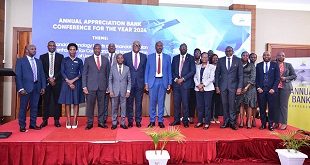
Annual Bankers’ Conference 2023 unveils strategies for digital resilience
Kampala, Uganda | PATRICIA AKANKWATSA | Cybersecurity has become a critical concern as digital transformation sweeps across Uganda’s banking landscape. The recently concluded Annual Bankers’ Conference 2023 provided a platform for industry leaders, experts, and stakeholders to deliberate on the escalating cybersecurity challenges facing the sector.
Speaking at the conference held under the theme; Trends & Innovations in the Fintech Space, Changing the Face of Banking & Financial Services, UBA chairperson, Sarah Arapta, said the banking sector is arguably one of the most impacted by the proliferation of disruptive technology.
“We have over 23 million bank accounts as of June 2023 in the system coming from under 7 million in 2016. Digital financial services are playing a significant role in growing credit markets in Uganda in support of the resilience and inclusive recovery following the lull experienced during the pandemic,”
She said the rising internet penetration and growing smartphone adoption, coupled with the demographic characteristics of a young and tech-savvy population, has increased the demand for the banks’ higher levels of service by today’s customer, who is eager for higher efficiency and cost and time-saving models with 24/7 availability.
This, she says, has significantly increased the innovations and variety of products and business models, to deliver value to the ever-changing and demanding segments of customers.
In addition, there has also been a significant increase in the number of entrants in the financial ecosystem and the emergence of digital finance.
Despite the numerous benefits, the innovations have come with associated risks, especially cyber risks that the financial institutions are aware of and are constantly developing strategies to mitigate against them.
UBA report released last year indicated that cyber fraud payments increased during Covid 19 period, constituting 31.9% of total industry fraud due to the uptake of electronic payment services.
Frank Molla, the head of the Sub-Saharan Africa Banking Payments and Commerce (BPC) said that cyber security is going a big threat in the country as grows because fraud thrives in wealthy countries.
“It (fraud) is increasing in Uganda and it is one of the major challenges you are going to have with innovations,’ he said.
“In most cases, we try to fix our houses when they are already leaking. You don’t have to fix a house when it is raining, you have to fix the house when the sun is up and this is as far as fraud is concerned and there are a lot of things that have been done in Uganda in terms of mitigating this vice.”
Molla added that there have been conversations about collaborations but collaborations cannot happen without processes.
“It is high time we start looking at things around fraud from a highway approach. We always look at things from a railway approach and the risk of doing this is that when one railway crashes, you are done but, on the highway, you still have more lanes,” he said.
Currently, Financial Technology (Fintech) continues to expand, grow and evolve not only in developed economies but also in emerging and developing economies through Fintech hubs.
Investments in payment-focused Fintechs are also expected to increase, given COVID-19’s impact on the consumer’s patterns and habits.
John Patrick Okiring, the chief executive officer of Ifortify Uganda said that the number one risk to cyber security is trusted identities.
He said there’s a need for entities to know who they are dealing with in terms of the people in their eco-system, what device they are using and who it belongs to.
Diana Majimbo, manager of cyber and intelligence at East Africa Mastercard said entities need to build the capacity of their staff in matters of cybersecurity and put in place mitigations measures such as teaching staff not to click on any links.
“First of all, we need to work on who are your plugins, and what are the potential risks they are bringing in, we do that at Mastercard and I think it is important for most companies to look at this,” she said.
She said there should be large-scale education not only at the Fintech level but also at the individual level.
The government in 2020 enacted the National Payment Systems Act, to among others regulate payment systems, provide for safety and efficiency of payment systems, and to provide for the functions of the Central Bank about payment systems.
To date, the Bank of Uganda has issued licenses to 25 fintech institutions as payment system providers and payment system operators. This has supported the increased adoption of digital payments with new use cases introduced in sectors such as health care, transport, savings and investments.
According to the Bank of Uganda Annual Report (2021-22), there has been continued growth in non-cash transactions over the various digital payment channels that include; EFTs, RTGS and Mobile Money.
During the year ended June 30, 2022, mobile money transaction values increased by 37.6% from Shs 113.38 trillion in June 2021 to Shs 156 trillion.
On the other hand, the transaction volumes increased by 22.1% from 3.9 billion transactions to 4.8 billion transactions over the same period.
 The Independent Uganda: You get the Truth we Pay the Price
The Independent Uganda: You get the Truth we Pay the Price


